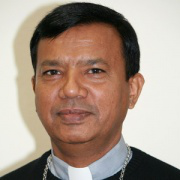Pakistan: Rimsha's release is a 'breakthrough' for justice

Bishop Sebastian Shaw
News from Pakistan that Rimsha Masih, the girl with learning difficulties accused of blasphemy, has been released on bail is a "big breakthrough" for justice, according to Catholic leaders in the country.
Catholic bishops and human rights activists said the court's decision to release the youngster on bail sent out a clear signal to the country's judiciary system to execute justice and not be compromised by pressure from powerful forces in society.
Her face covered by a green scarf and accompanied by a heavily-armed police escort, Rimsha Masih boarded a helicopter yesterday Sunday (9 September) afternoon bound for a secret location. The girl's dramatic departure from jail in Rawalpindi, near the capital, Islamabad, came a day after a court decided to release her on bail. It followed the arrest of Hafiz Mohammed Khalid Chishti, who stands accused of falsifying evidence to show that Rimsha burnt an Islamic text containing verses from the Qur'an.
Amid uncertainty about Rimsha's birthdate, a medical board reported 10 days ago that she had a physical age of about 14, but that her learning difficulties meant that her mental age is well below that. The case is to be handed to a juvenile court.
In an interview today, Monday, 10 September, with Aid to the Church in Need, Bishop Sebastian Shaw, Apostolic Administrator of Lahore Archdiocese, said: "This is a big break-through. The court's decision to release Rimsha on bail gives courage to other judges to act in a similar way... it gives them courage to settle these kinds of matters in a more appropriate way."
Bishop Shaw added: "Many Muslims were thinking in a positive, sympathetic way but weren't able to say as much openly. With this precedent, they may be encouraged to say what they want."
Earlier, Archbishop Joseph Coutts of Karachi told Aid to the Church in Need: "This has come as a shock to everybody. What we have seen is a real challenge to our judiciary. The question has been: 'will we get an objective assessment or will the court give in to the emotionalism of those opposing Rimsha?'"
Archbishop Coutts said that abuse of the blasphemy law was problematic and that there were previous incidents of allegations being made using falsified evidence. He said: "In many cases there have been problems with the evidence. We have to let the facts speak for themselves."
His comments echoed those of Peter Jacob, chairman of the Pakistan Catholic Bishops' National Commission for Justice and Peace, who said he was pleased about the court's decision to release Rimsha. But he described as "incomprehensible" the court's decision to set a bail of one million Pakistani rupees (about £6,200) for Rimsha.
He said: "Of course such a bail condition can be met because of the amount of support Rimsha has received. However it is insensitive of the court to insist on such a large amount considering that Rimsha's family are poor labourers. It is very disproportionate given their financial situation."
Both Mr Jacob and Bishop Shaw stressed that Christians and other communities were delighted by Rimsha's release.
Mr Jacob said: "Rimsha should have been declared innocent by the court. The reason it did not do so is because the judicial system does not have the will to ensure that justice is done."
Having just returned from a three-day Marian festival at the Catholic shrine in Mariamabad, near Lahore, Bishop Shaw said: "People were so happy. At the pilgrimage, people prayed for justice in Pakistan. We prayed that many people waiting for justice may receive justice."
Source: ACN


















